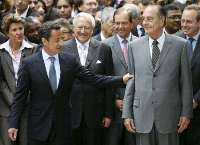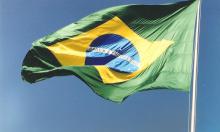Jacques Chirac meets his successor Nicolas Sarkozy
Jacques Chirac and his successor met for the first time since Nicolas Sarkozy's presidential victory, jointly leading a ceremony honoring victims of slavery and meeting the son of slain former Lebanese Prime Minister Rafik Hariri.

Many expect France's relations with the Arab world to cool with the departure of Chirac, a close friend of Hariri and former protectorate Lebanon.
But Saad Hariri told reporters after the meeting that Sarkozy had pledged to "continue the relations between Lebanon and France in the same manner as in the past with President Chirac." He said Sarkozy also backed the idea of an international tribunal to investigate the killings of his father and other anti-Syrian figures in Lebanon.
Sarkozy and Chirac onetime allies from the same conservative camp who have had tense ties in recent years did not speak publicly after the meeting.
They rode to the meeting in the presidential palace in the same car after a poignant ceremony in Paris' Luxembourg Gardens, where Chirac unveiled a chain-like sculpture in honor of victims of slavery, 159 years after France abolished the practice.
Chirac announced the national commemoration day last year, soon after the 2005 riots, which raised questions about France's model of integrating minorities and the lingering scars of its colonial past.
Anti-Sarkozy protests continued, though postelection unrest that left more than 1,200 cars burned around the country earlier this week appeared to be ebbing.
About 150 student protesters occupied a branch of the University of Paris in the south of the capital on Thursday, said university officials, who decided to temporarily shut down the school after the move.
On Wednesday night, hundreds of far-left protesters marched through Paris' Latin Quarter. Riot police detained dozens of people while enforcing a buffer zone between those protesters and far-right activists holding a commemoration nearby, officials said.
Sarkozy's abrasive language, tough line on crime and immigration, and proposals to weaken labor protections have angered many on the left and in rundown apartment complexes that erupted in riots in 2005. Despite his solid victory over Socialist Segolene Royal, many predict he will meet street protests and other resistance to his planned reforms.
After a brief postelection vacation, Sarkozy huddled Thursday with lawmakers from his conservative party to plan for next month's legislative elections that are crucial to those reforms.
The UMP party currently has a large majority in both houses of parliament but must keep it that way if Sarkozy wants to follow through quickly on ambitious plans to cut taxes, reform labor laws and minimize the effect of France's frequent strikes.
Meanwhile, the centrist lawmaker who scored a strong third-place in the presidential elections, Francois Bayrou, struggled Thursday to rally his fractured followers and save some of the momentum from winning nearly 7 million votes in the first round. He formally announced the creation of a new political party, the Democrat Movement, in place of the longstanding UDF party.
Sarkozy takes over May 16 from Chirac, who is leaving after 12 years in office.
Subscribe to Pravda.Ru Telegram channel, Facebook, RSS!




